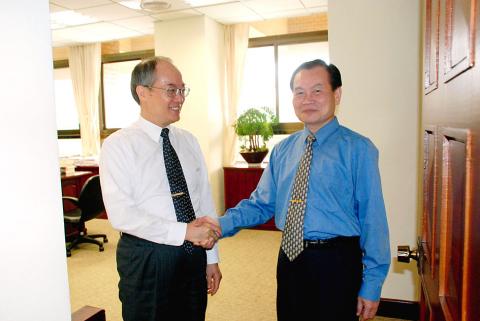|
KMT infighting suspected in
resignation
By Shih Hsiu-chuan, Mo Yan-chih and Chris Wang / Staff reporters

Tseng Yung-fu, right, and
Prosecutor-General Huang Shih-ming shake hands in an undated photograph.
Photo: CNA
Minister of Justice Tseng Yung-fu (曾勇夫)
stepped down last night over his alleged use of influence to stop a prosecutor
from appealing a breach of trust case involving Democratic Progressive Party (DPP)
caucus whip Ker Chien-ming (柯建銘) after Legislative Speaker Wang Jin-pyng (王金平)
allegedly asked a favor of him for Ker.
Tseng’s announcement of his resignation at a 9:47pm press conference came only
after Premier Jiang Yi-huah (江宜樺) took the issue to President Ma Ying-jeou (馬英九)
earlier yesterday evening, after Tseng expressed no intention of resigning
during a 70-minute meeting with Jiang, starting at 3:30pm, sources said.
After returning from his meeting with Ma, Jiang scheduled a second meeting with
Tseng that began at 7:25pm and lasted for 45 minutes.
At the press conference, Tseng reiterated his statement that the allegations
against him were "groundless."
Shame on those who fabricated the allegations against him, he said, adding that
he decided to resign for the sake of the ministry and that "because I didn’t
want to cause [my] superiors trouble."Ma and Jiang both said Tseng’s resignation
was approved.
Earlier yesterday, Ma expressed distress over Tseng’s and High Court
Prosecutors’ Office Head Prosecutor Chen Shou-huang’s (陳守煌) alleged involvement
in illegal lobbying and said the government would not tolerate political
manipulation of judicial cases.
“President Ma is shocked and saddened by the incident. The president believes
that justice is the foundation of trust for the government and the last line of
defense for social justice. There’s no room for political interference in any
judicial case,” Presidential Office spokesperson Lee Chia-fei (李佳霏) said.
The Presidential Office did not mention Wang and declined to comment on
speculation that Ma was using the incident to weaken Wang’s political influence
and the Chinese Nationalist Party’s (KMT) old power bloc.
Lee said Ma has instructed related agencies to spare no efforts to investigate
the case and clarify the situation.
The KMT yesterday also maintained a low-key attitude in response to the case and
said it would wait for the results of the investigation when asked whether the
party would address the alleged involvement of Wang, a KMT member, in illegal
lobbying.
Some KMT members expressed concern about the impact of Wang’s lobbying on the
party’s reputation and said the KMT should handle the case carefully.
The KMT revoked the party memberships of former Executive Yuan secretary-general
Lin Yi-shih (林益世) and Taipei City Councilor Lai Su-ju (賴素如) earlier this year
over their alleged involvement in bribery cases. The KMT did not say whether it
would use party regulations against Wang.
Wang does not have a position within the KMT, but as legislative speaker and a
key figure in the party’s localization factions, he has had great influence over
the party.
Wang also represents the KMT’s old power bloc, along with party heavyweights
including former KMT chairman Lien Chan (連戰) and Wu Poh-hsiung (吳伯雄), and has
had problematic relations with Ma in the wake of fierce competition over the KMT
chairmanship in 2005.
The alleged influence-peddling case was made public by the Special Investigation
Division (SID) earlier yesterday in a text message informing the press about the
news conference that said: “You do not want to miss it.”
Commenting on the matter, KMT Legislator Liao Cheng-ching (廖正井) said he saw it
as “sheer infighting” in the government’s judiciary system.
Tseng and Prosecutor-General Huang Shih-ming (黃世銘) have had a frosty
relationship, caused partly by Tseng having rejected Huang’s suggestions for the
appointments of a number of chief prosecutors, Liao said.
The SID, led by Huang, was driven by the “mindset of revenge” against Tseng to
look into the case, Liao added.
The allegations against Tseng deserved to be investigated, but that did not make
the infighting situation less worrisome, Liao said.
Liao also expressed concerns over eavesdropping on and surveillance of lawmakers
by SID prosecutors, saying that the actions have contradicted the SID’s repeated
pledges not to do so.
KMT Legislator Apollo Chen (陳學聖) held a different view, saying the SID should
continue its investigation into the case to get to the bottom of what were the
roles the accused had played in the case.
Some KMT members, including KMT Policy Committee head Lin Hung-chih (林鴻池) and
Legislator Lu Hsueh-chang (呂學樟), spoke up for Wang, saying the SID’s statement
failed to prove that Wang had illegally exerted his influence to urge the SID to
drop the case. There is a gray area between legal lobbying and influence
peddling, they said.
The DPP caucus said the SID’s referral of Tseng to the Control Yuan for possible
impeachment was unprecedented, a case in which prosecutors referred a government
official to the government watchdog, which violated the separation of powers
under the Constitution.
“It seemed to me that it was an internal struggle of the Ma administration —
infighting between Ma and Wang and between Huang and Tseng,” said DPP Legislator
Wu Ping-jui (吳秉叡), a former judge.
The longstanding tension between Huang and Tseng has been an open secret, but it
was suspicious that the SID called the press conference when Wang was out of the
country, Wu added.
It was also unusual for the SID to announce the results of its investigation,
but decide not to probe further into Wang and Ker, citing legislative
self-discipline, Wu said.
Commenting on the matter, Lin Feng-jeng (林峰正), executive director of the
Judicial Reform Foundation, said it was strange the SID was in a rush to
announce the investigation despite Tseng and Chen not having been summoned for
investigation.
Lin added that he could not care less about whether the investigation was
politically motivated because the important thing was if the influence peddling
occurred.
|
![]()
![]()
![]()